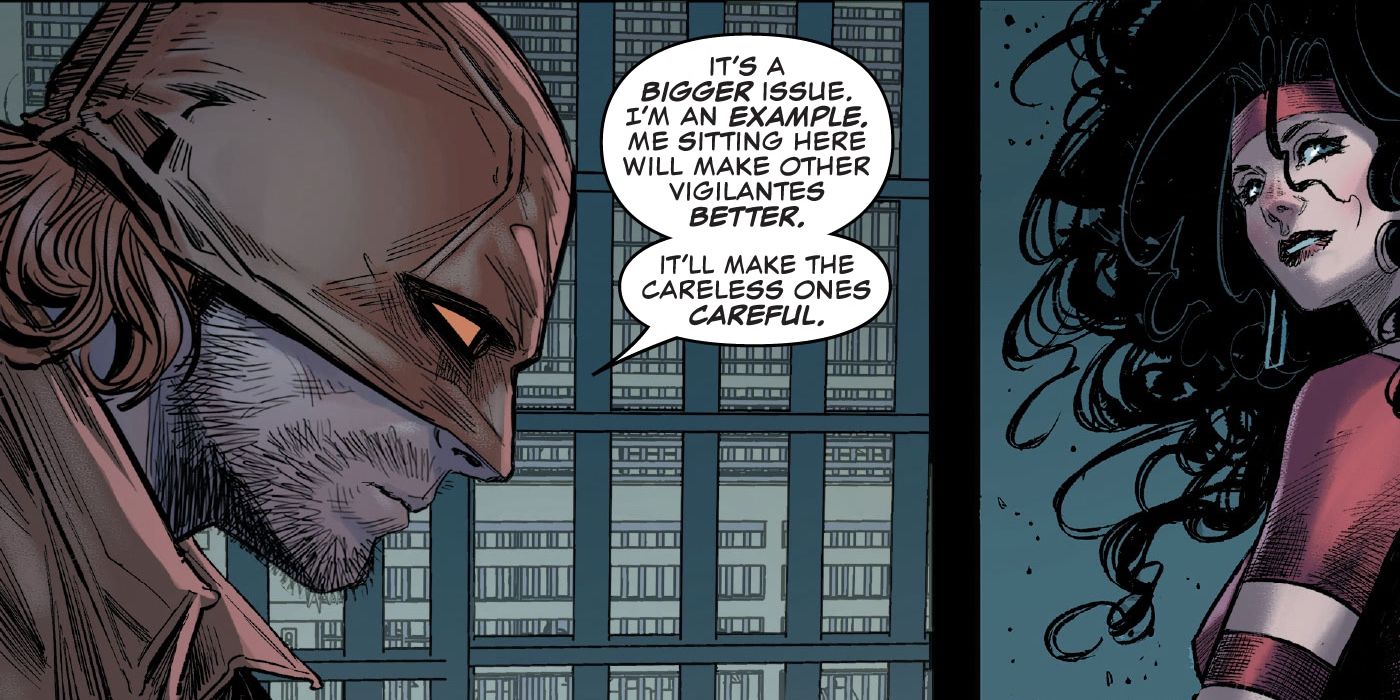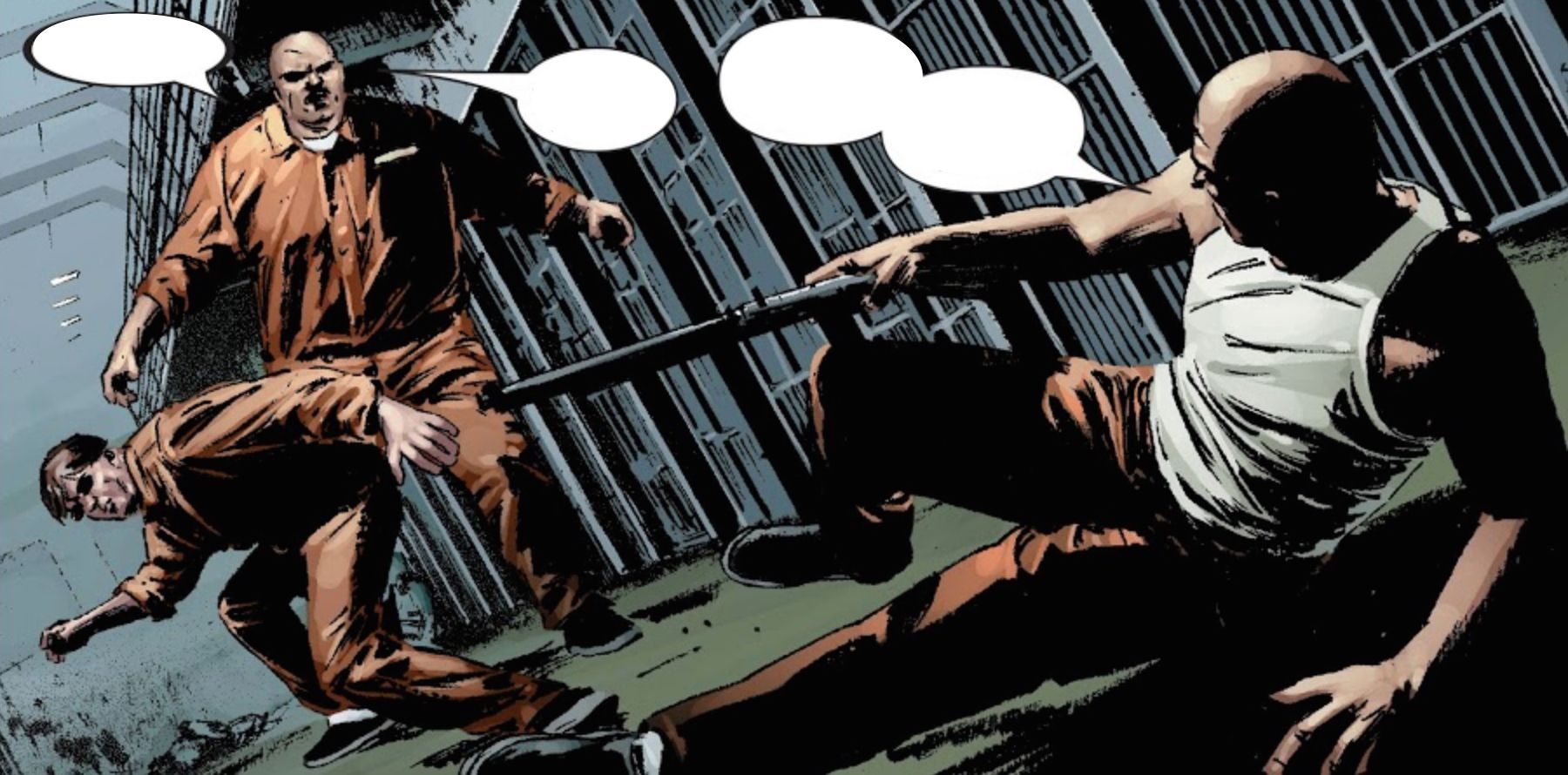Matt Murdock’s time imprisoned as Daredevil has often resulted in him facing his demons and becoming a better man in Marvel Comics, but have also almost exclusively been periods where he has failed New York as a superhero. So far Daredevil has been imprisoned twice in Marvel Comics, the first time was in 2006 as Matt Murdock in the Devil in Cell Block D storyline that heralded the start of Ed Brubaker and Michael Lark’s Daredevil run. Recently, Murdock has once again served time during Chip Zdarsky’s current run on the series but under the identity of his alter-ego, Daredevil.
The Devil in Cell Block D arc followed on immediately after the conclusion of Brian Michael Bendis and Alex Maleev’s run on the series which saw Matt Murdock outed in the press as the secret identity of Daredevil, suffer an extended mental breakdown, and saw him briefly take over the role of the “Kingpin of Crime” from his arch-nemesis Wilson Fisk. Murdock was arrested by the FBI on multiple charges (all, in reality, window-dressing for their dogged obsession of proving he was Daredevil) and was placed in Rykers, without bail, to await trial. The FBI hoped that being imprisoned alongside Fisk and numerous of his other enemies would force Murdock to defend himself and thereby prove he was in fact Daredevil. Murdock eventually escaped prison with the aid of the Punisher, after the FBI engineered a prison riot that they hoped would result in Fisk, Murdock, and the supervillain Bullseye killing one another.
Most recently, Chip Zdarsky and Marco Checchetto’s Daredevil run began with a weakened Murdock inadvertently overcompensating as Daredevil and accidentally causing a thug to suffer a massive brain hemorrhage as a result of his injuries, leading to his death. Guilt-ridden, Matt tried to retire as Daredevil but realized that only he alone could protect Hell’s Kitchen from both super-villainy and organized crime. Eventually, Matt was captured by the police, and whilst legal precedent allowed for him to maintain his secret identity and be tried as “Daredevil” and not Matt Murdock, he chose to plead guilty to second-degree manslaughter and serve his time. However, like his previous stint behind bars, Daredevil was forced to struggle against systemic corruption and was eventually freed early for assisting (ironically) the FBI in proving that the prison was experimenting with new illegal narcotics on the inmates.

As a character, Daredevil is arguably characterized by three core struggles: his commitment to his lifelong Catholic faith, the hypocrisy of fighting corruption as a lawyer by day but as a vigilante by night, and the battle to control his violent tendencies. These struggles, whilst compelling, often result in the character of Matt Murdock behaving incredibly selfishly; placing his moral quandaries above the wellbeing of his loved ones and the greater good of Hell’s Kitchen. Whilst both instances of Matt’s imprisonment show him face his three core struggles, and end up a better character as a result, they are also both periods where Matt has allowed his selfishness to eclipse how he can best serve Hell’s Kitchen as Daredevil.
Devil in Cell Block D begins in issue #82 when Matt’s long-suffering best friend and law partner, Foggy Nelson, is attacked whilst visiting Matt in prison. Believing Foggy dead, Matt gives in to his violent tendencies and terrorizes the other inmates of Rykers in an attempt to discover who was behind the attack on Foggy. Incredibly it takes the intervention of Frank Castle, the Punisher for Matt to realize that prison is acting like a savage echo chamber for him: constantly reaffirming his cycle of violence. In issue #85 Punisher tells Matt that he had himself thrown into Rykers to watch “what it looks like when you turn into me.” Matt rejects this but realizes he is so consumed with vengeance and guilt that he is almost willing to help Fisk and Bullseye escape in return for them helping him track down Foggy’s killers. Punisher then helps Matt escape telling him that he had lost himself in prison: “You don’t want to be me. You needed to remember that.”
Prison was torture for Matt because it reminded him that for all his power and skill he remains continually incapable of protecting those he loved. But rather than channeling his efforts into legally fighting the charges against him, so he can once again be free to protect Hell’s Kitchen he selfishly indulges in his rage. Matt leaves prison, recommitted to being the hero his best friend believed him to be, but not until he has to be dragged back from the brink.

Alternatively, Zdarsky and Checchetto’s Daredevil uses Matt’s time in prison to show how the hero’s belief in moral righteousness leads him to make decisions that, whilst helping to assuage his guilt, are detrimental to the people he is trying to protect. As a Catholic, guilt has always been a burden for Matt; guilt that he chooses to use violence to achieve his goals and guilt that he has dedicated his life to upholding the rule of law only to act as though he is above it. As he is being tried for manslaughter Matt is originally prepared to fight the charges, knowing that he is the only man who can protect Hell’s Kitchen in the face of systemic police corruption, but changes his plea last second to the horror of his friends. Foggy, Elektra, police officers, the prison psychologist, and even his fellow inmates point out the prison is not going to make Daredevil a better person or rehabilitate him (one of prison’s main purposes) and that he is instead using is a form of self-flagellation to assuage the guilt of accidentally killing a man. As Daredevil he could be out helping and protecting those innocents who still need him in Hell’s Kitchen but he is choosing to stay in prison to prioritize his moral code.
In issue #5 of Daredevil, by Zdarsky and Checchetto, Matt is confronted by fellow superheroes Luke Cage, Danny Rand, and Jessica Jones who all reveal they know what Matt is going through. All of them have been put in terrible situations which have led to people dying as a result of their actions, but all understand it is part of the territory. As a hero, their duty is to learn from it and move on so they can keep helping people. Even Spider-Man later reaffirms this to Daredevil. Matt argues that he is going to prison to act as an example to the public and to other heroes that nobody is above the law, but realizes his folly in issue #35 when he escapes prison in time to stop the killing-spree of Bullseye, but only after he has murdered over 30 people. Whilst his time in prison allowed Matt to learn to overcome his guilt and learn to forgive himself, Zdarsky seems to suggest lives could have been saved if Matt helped stop Bullseye’s rampage earlier.
Daredevil is such a compelling character because of three core struggles: continuing his commitment to Catholicism, the hypocrisy of being both a lawyer and indulging his violent tendencies. His time in prison has allowed the hero to confront these struggles at their most arduous, and he has become a better man. But this comes at a price, as it also sees the character at his most self-indulgent, resulting in these periods being the times Daredevil fails most as a hero.




